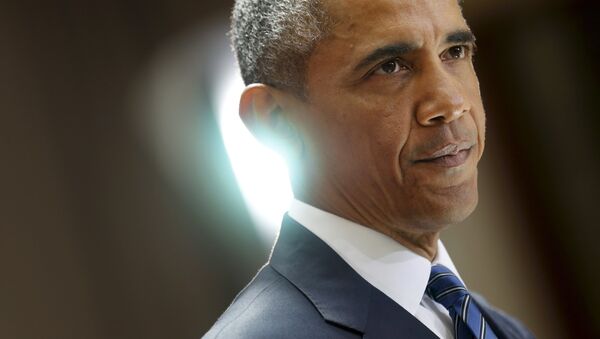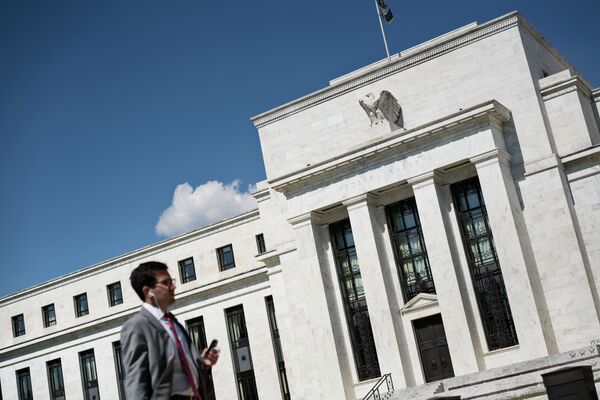In his speech, Obama painted a picture of a country, which has overcome a major economic crisis and has played a leading role in tackling every major global challenge, including terrorism and climate change.
“It’s in that spirit that we have made the progress of these past 7 years.” —@POTUS on the American spirit #SOTU pic.twitter.com/tx4HquIsI4
— The White House (@WhiteHouse) 13 января 2016
Let's take a look a closer look at some of the statements.
It's about the economy, stupid
"Let me start with the economy, and a basic fact: the United States of America, right now, has the strongest, most durable economy in the world. … Anyone claiming that America's economy is in decline is peddling fiction," the US president said boldly.
Indeed, the figures speak for themselves. The US economy added approximately 3 million jobs in 2015, while the unemployment rate has settled at 5 percent – roughly the same as it was before the Great Recession. The same month, the Federal Reserve raised US interest rates for the first time in almost a decade, which appears to point to a steady recovery.
As usual in current recovery, many jobs created in December either temporary or permanent low wage. US wages continue to stagnate/fall.
— The Mays Report™ (@MaysReport) 8 января 2016
If only the US economy were truly as healthy as advertised.
"A low unemployment rate and dwindling pool of skilled workers suggest that hiring could slow this year. The US could also get hurt if the global economy takes a turn for the worse, particularly if China is hobbled," MarketWatch warned earlier in January.
Obama himself acknowledged that there were other worrying trends, including companies shifting operations overseas and income inequality growing. "It's made it harder for a hardworking family to pull itself out of poverty, harder for young people to start on their careers, and tougher for workers to retire when they want to," he observed.
So while we're complaining that US wages haven't increased since the 1980's, they've actually decreased. https://t.co/z7IOxgnfxY
— iamfreedom (@iamfreedom777) 3 января 2016
Consider this: average hourly wages in the US have grown slowly, reaching 2.5 percent in October and flatlining in December. Wage growth, often seen as one of key indicators of economic health, should not fall below 3-4 percent to keep the economy back on track.

Degrading and destroying Daesh… or not
In September 2014, Barack Obama pledged to wipe the brutal group off the face of the earth, enlisting more than 60 nations to help the US achieve this goal.
"With nearly 10,000 air strikes, we are taking out their leadership, their oil, their training camps, and their weapons. We are training, arming, and supporting forces who are steadily reclaiming territory in Iraq and Syria," the US president noted.
It would have been truly an achievement, but time has shown that 10,000 airstrikes are not enough to destroy the so-called caliphate. True, the group has suffered major losses in the last months, but those are largely attributed to Russia's aerial campaign in Syria. Moscow has also been relentless in its push for lasting and sustainable peace in the country.

The reality on the ground is different. Syria is torn apart by foreign fighters and sectarian violence. Washington's efforts to train an army of so-called moderate rebels to fight Daesh have turned into a $500-million failure. In October, US Defense Secretary Ashton Carter said that the US had no more than five trainees fighting in Syria.
3 A.M. call in International Crises
"When it comes to every important international issue, people of the world do not look to Beijing or Moscow to lead – they call us," Obama asserted.
In fact, tackling global challenges requires multilateral efforts; not a single country is capable of dealing with a major crisis on its own. The Iran nuclear deal and the Paris agreement on climate change have largely been seen as key diplomatic achievements of 2015. They would not have been possible, if leading global powers like Russia and China were not on board.
Similarly, when the US was on the verge of launching a military intervention in Syria in 2013, it was Moscow who offered an alternative, peaceful, solution. As a result, Damascus' chemical stockpile has been destroyed and not a drop of blood was spilled in the process.

Beijing's leadership is also a fact, the US cannot deny. Take the Asian Infrastructure Investment Bank (AIIB), spearheaded by China. The $100 billion lender is an international institution designed to provide financial support to infrastructure projects in Asia.
Beijing's initiative has largely been welcomed with open arms but the United States and Japan are among the few countries, which have decided not to join. Moreover, Washington has tried to pressure several other states, including its allies, to avoid joining the development bank.
Moving forward requires a critical look back.




